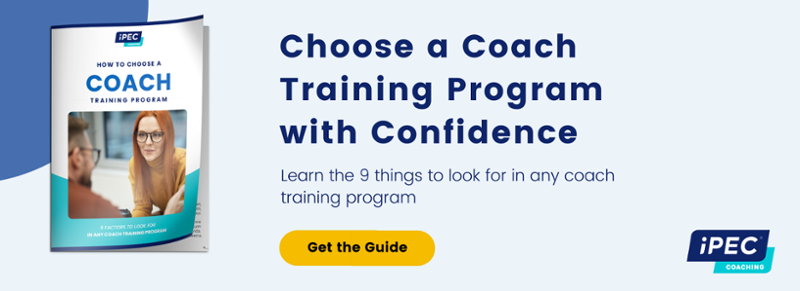A Primer on Coaching
by Farrah Hudson
Dec 22, 2016 | 8 minutes read
What is Coaching?
The answers depend on the impact you wish to have. Your work as a coach will be different depending on if you’re satisfied helping people hit goals or if you propel clients toward their highest potential.
Members of the International Coach Federation (ICF) have defined coaching as “partnering with clients in a thought-provoking and creative process that inspires them to maximize their personal and professional potential.”
Coaching, at its very best, is about helping people make profound and lasting shifts in their lives. Of course, it’s not to be confused with simple accountability and encouragement. This is the difference between traditional coaching and coaching mastery.
Traditional Coaching
In its simplest form, coaching is about helping another person strive toward their stated goals and objectives. This is accomplished by helping them follow through on tasks and respond to challenges. In this sense, it can be likened to a personal trainer. Instead of the body, the focus is their life or business. Rather than provide a workout routine, a coach guides them with accountability and encouragement.
The weakness of this traditional definition is revealed in the words “their stated goals and objectives.” Left on their own, too many people limit what they say they can or want to accomplish. They do this in the interest of being “realistic” or “practical.” In reality, they may have no idea what they are capable of and are simply afraid of disappointment.
Unfortunately, some individuals have grown accustomed to feeling successful by just lowering their expectations – or worse, setting no goals at all. Still, others have all the enthusiasm required. They are great at constantly taking action but can’t figure out why they repeatedly fail. There seem to be hidden blocks that cause them to always fall short of their goals and desires. Left on their own, most people limit what they say they can accomplish.
Masterful Coaching
Where ordinary coaching leaves off, coaching mastery begins. Coaching mastery is much more than just traditional accountability or encouragement. As a skillful coach, you have the opportunity to help a client explore new goals, broaden their sense of what is possible in their life, and provide real tools to reach their full potential.
As their coach, you take on the role of raising the deeper questions that a person might not otherwise ask themselves. You challenge them to think bigger and perhaps question the “story” they have told themselves and begun to accept. With proper training, you become skilled at presenting this kind of challenge constructively, with finesse.
By going beyond traditional coaching, you help your client open an entirely new realm of possible results. This is because you are trained to help a client become aware of their internal world: their driving motivations and self-limiting factors. A coach then leads them in making permanent and profound shifts in the way they approach their problems, their goals, their world, and those around them. In this way, you have an impact on your client that continues long after the coaching engagement ends.
Masterful Coach Training
This is what sets the training at iPEC apart from all others. Our Core Energy Coaching™ is a unique method that helps your client achieve sustainable external results by making profound internal shifts. Coaches trained in this method say it is the key to making a real and satisfying difference in the world – and their clients agree!
Coaching's Mistaken Identity
Coaching is sometimes confused with other helping modalities such as consulting, mentoring, training, or therapy. Actually, it’s none of these and yet so much more.
Coaching vs. Consulting
The critical distinction between consulting and coaching is who is viewed as the “expert.” Consulting emphasizes finding an external expert and is problem/solution oriented. Clients hire a consultant to help them define their problems and then formulate solutions to fix them. The consultant is usually viewed as the expert in what needs to be done and may go so far as to implement the solutions they recommend.
In contrast, the coaching methodology views clients as the “experts” in their own lives and businesses. A coach does not tell a client what to do but facilitates the client in discovering their own answers. It might seem more expedient to just deliver advice, but experience shows that people are much more likely to take ownership of, and follow through on, ideas that are their own.
In this sense, the coach serves as a sounding board, confidant, and trusted advisor – roles not central to the work of a consultant. If the coach is viewed as an expert, it is in providing guidance, tools, and methods for the client to improve their own ability to implement solutions, now and in the future.
Consultants improve situations; coaches improve people.
Coaching vs. Mentoring
Mentoring can be likened to serving as a wise role model. While mentoring may include advising, counseling, and coaching, it’s usually about helping the mentee to emulate the mentor’s own success. A mentor is often chosen because they have traveled the road the mentee wishes to follow.
A coach on the other hand empowers clients to find their own path. A coach can certainly have valuable experience and insight in the client’s field. However, a coach’s value lies not in their technical expertise but in the ability to help a client draw from their own experience and wisdom as they move ahead.
A mentor says, “Follow me.” A coach reveals where the client stands on the map and asks, “Where shall we go next?”
Coaching vs. Training
When specific skills or objectives must be mastered, training is an effective approach. It uses an established curriculum set out by the trainer or instructor and measures effectiveness based on a set of predetermined outcomes. A pre-test and post-test can even determine if the student successfully moved from point A to point B in their understanding of the subject.
While the coaching process often includes clarifying objectives, it’s about guiding individuals or groups as they set and reach their own objectives. In this sense, coaching is less linear and more organic.
Training is curriculum focused. Coaching is client focused.
Coaching is Not Therapy
Therapists work to move their patient from a state of dysfunction to being a fully functional individual. Often this centers on resolving conflict within the individual or in a relationship, overcoming past issues, healing trauma, and sometimes managing mental illness. Therapy, therefore must often deal with the past so that a patient can exist in the present.
In contrast, a coach works with fully functional individuals and focuses on a client’s plans for the future. The process is results oriented and helps clients advance from functional to outstanding –and often from outstanding to great!
Therapy examines the past to help a client cope with the present. Coaching builds on the present to create the future.
Who Becomes a Coach?
So, who are these people, and what are they like? It won’t surprise you that they come from many walks of life. However, they do share a few characteristics.
Some arrive at coaching after a dramatic personal experience that alters the course of their life, driven with a determination to live out their calling and make a difference. That was certainly the case in the instance of iPEC’s Founder, Bruce D Schneider, following his near-death encounter in a car accident.
This group is by no means the majority of life coaches, but we think it’s quite an interesting indicator when such people choose to pursue coaching to live out their vision of changing the world, one person at a time.
Others come from the business world with experience in a specific field. They see coaching as a better alternative to consulting because it allows them to engage more fully with clients from their industry (such as small business development, real estate, sales, human resources, and many more). With an existing network of contacts, such people find they can promote themselves within a narrow niche and quickly gain credibility for their insights and the ability to relate to their clients’ needs.
Many paths lead to coaching, and coaching offers many paths.
Many more draw upon their broader work history and personal interests to help guide their decisions on how they want to pursue coaching and bring their unique skills to the world.
- For some, the appeal of coaching is immediate, before they ever launch a traditional career or take a trip into the corporate world.
- Sometimes, it’s a person ready to remake their career or set course in a new direction.
- Others may have taken a career detour to raise a family and find that coaching allows them the flexibility to gradually reintegrate into the professional world on their own terms.
No matter how they find their way to coaching, once they are immersed in it the focus shifts away from where they have been to where they want to steer their coaching practice.
The Pathways of Coaching
To serve this diversity of experiences, backgrounds, and motivations, iPEC has developed our coach training around eight specific areas of concentration that you can choose from as a “major” during your training:
- Executive Coaching
- Life Coaching
- Transition Coaching
- Health and Wellness Coaching
- Professionals Coaching
- Business Coaching
- Relationship Coaching
This specialized training prepares you to focus on the segment of clients who you will most enjoy coaching. Some students take it even further after selecting one of the eight concentrations by then developing a highly specialized niche of their own. For example, there are coaches that help people:
- Plan overseas retirement.
- Advocate for themselves during a health crisis, such as cancer.
- Care for aging parents without being overwhelmed.
- Survive their children’s teen years.
- Successfully navigate and recover from a breakup or divorce.
Is Coaching Effective?
In-depth studies conducted by the International Coach Federation reveal the numerous ways individuals, their employers, and even co-workers and family can benefit when one works with a coach.
The person who works with a coach gains a fresh perspective on their personal challenges. That in itself is huge – what wouldn’t a person give to finally gain insight into their blind spots?
Respondents say that this self-awareness leads to improved:
- Self-confidence
- Relationships
- Communication Skills
- Life/work Balance
What's the ROI for a Coach-In-Training?
Effectiveness and return on investment (ROI) are primary concerns for organizations that utilize coaching. Employers not only want to know that they are getting their money’s worth but also whether coaching is the best option they have for overcoming challenges and improving organizational outcomes.
This keen eye on the bottom line is what makes quite an endorsement that fully 86% of companies rate their ROI favorably for their investment in coaching (saying that coaching at least paid for itself). In fact, a broad range of ROI figures for coaching have been reported in research literature. These include estimates of 221% (Phillips, 2007), 545% (McGovern et al., 2001) and 788% (Kampa-Kokesch & Anderson, 2001), with figures of between 500% and 700% commonly reported as being a reliable ROI for executive coaching (Anderson, 2008).
While we better understand the benefits behind coaching both individuals and organizations, there are distinct advantages for you, the coach, to excel your bottom line as well. Students who have studied at iPEC have raved about their coach training, affirming their ROI commenced with Module I – Life and Leadership Potentials Training (LPT), saying confidently, “If they never coach another person, the insight they received about themselves and how they ‘show up’ in the world from a personal development standpoint was still an investment worth millions.”
In addition, over 85% of iPEC students have paying clients – and sometimes many paying clients – before they graduate. Why? Because iPEC’s curriculum focuses a substantial portion of time on helping you build your own coaching practice through business development, branding/messaging, and marketing. All-inclusive tuition and client fees also help offset the cost of training and certification, putting a comprehensive education and financial rewards at top of mind.
“I attended the iPEC Life and Leadership Training Module in Toronto and found it to be extremely informative and helpful for my professional and personal development.
Professionally, the training provided me with the tools to ascertain employees’ energy levels through the Core Energy framework and to assist them in their career development through coaching and utilizing the iPEC tools.
Personally, the training enabled me to revisit certain aspects of my own professional development to highlight areas of growth that will help me to succeed at the next level in my organization and to reach my full potential.”
– Jennifer Mercanti, iPEC Student
How Does Coaching Help People?
According to the International Coach Federation, those who utilize professional coaching boast that it helps to unlock their potential and build on latent sources of productivity, resulting in improved:
- Work Performance
- Business Management
- Time Management
- Team Effectiveness
These organizational impacts are in addition to the personal benefits discussed above. This helps explain why coaching continues to grow and expand as a field of interest, as a service in high demand by individuals and organizations, and as a profession.
How likely are people to continue with coaching or to recommend it to others?
The real measure of satisfaction for coaching clients is how they perceive the experience themselves. Coaching is profoundly beneficial in the eyes of companies and individuals who hire a coach, with 99% viewing it as “satisfied or very satisfied” and 96% stating, “They’d repeat the Process.”
Clients often continue with coaching as long as they remain satisfied with their progress and enjoy the benefits of the relationship. That is what sets coaching apart from consulting – it truly is a relationship rather than a transaction. Instead of working to solve just one set of problems, as a coach, you are helping the client navigate the totality of their personal and/or professional world. That is what makes it extremely satisfying for both the client and the coach.
The Effectiveness of Your Coaching
Now that you’ve seen more of the facts about the effectiveness of coaching, what does this level of positive feedback mean for you and your thoughts of becoming a coach? How different is it from what you may currently be doing for a living or as a professional endeavor? If you chose to incorporate coaching skills into what you presently do, what impact would that have on your career and professional satisfaction?
One thing is certain: If your desire is to have an impact and make a difference in the world of those around you, coaching offers an unparalleled vehicle for doing so.
Could coaching be what you’ve been looking for?
You now understand more of what draws people to coaching.
You see that coaching can be broadly focused or narrowed to a highly specific niche.
What would be the ideal approach for your own situation? Why not find out by learning more about training and certification? As those who set the standards for professional excellence in the industry (it is our middle name after all), we’re here to help.


